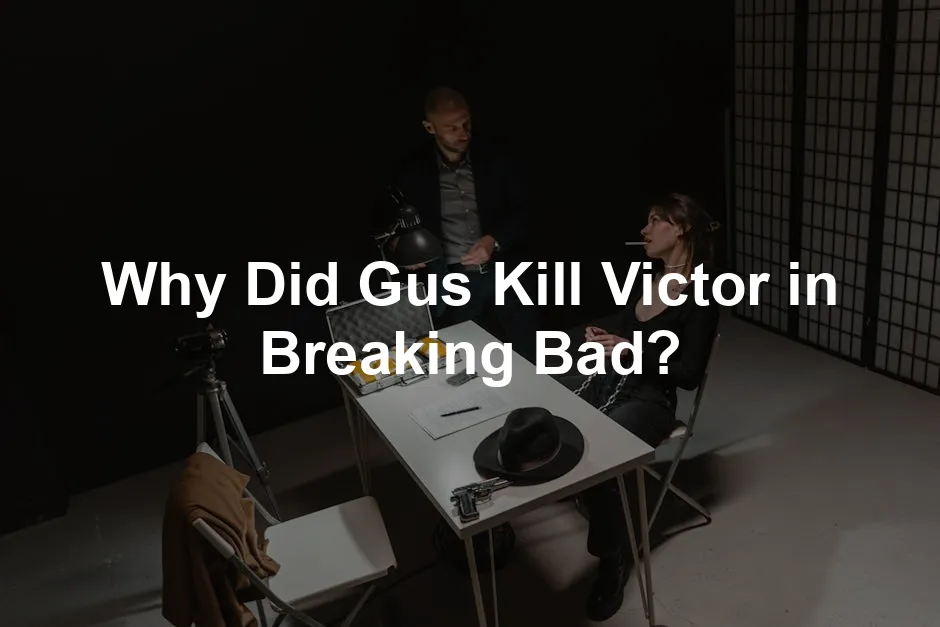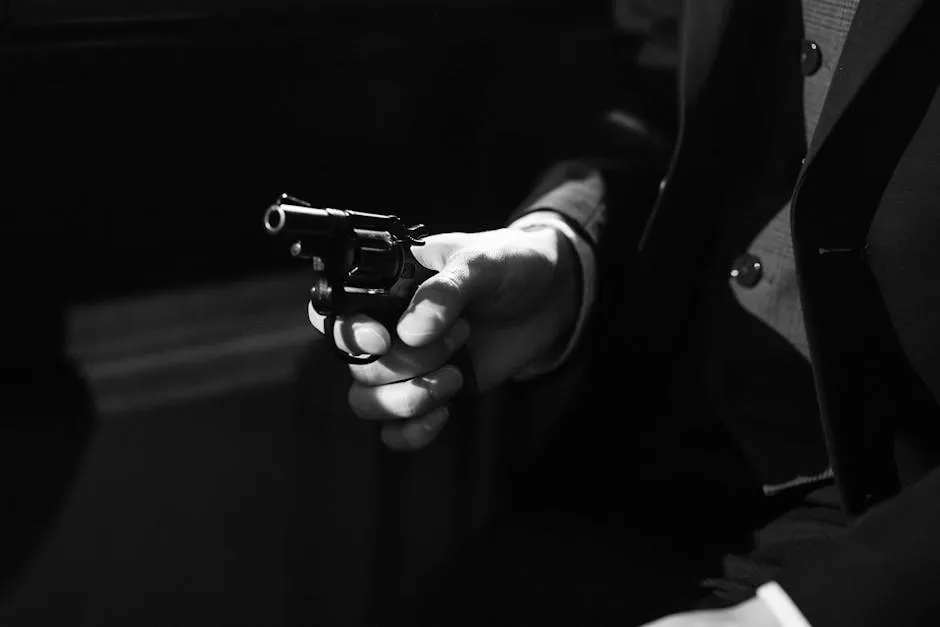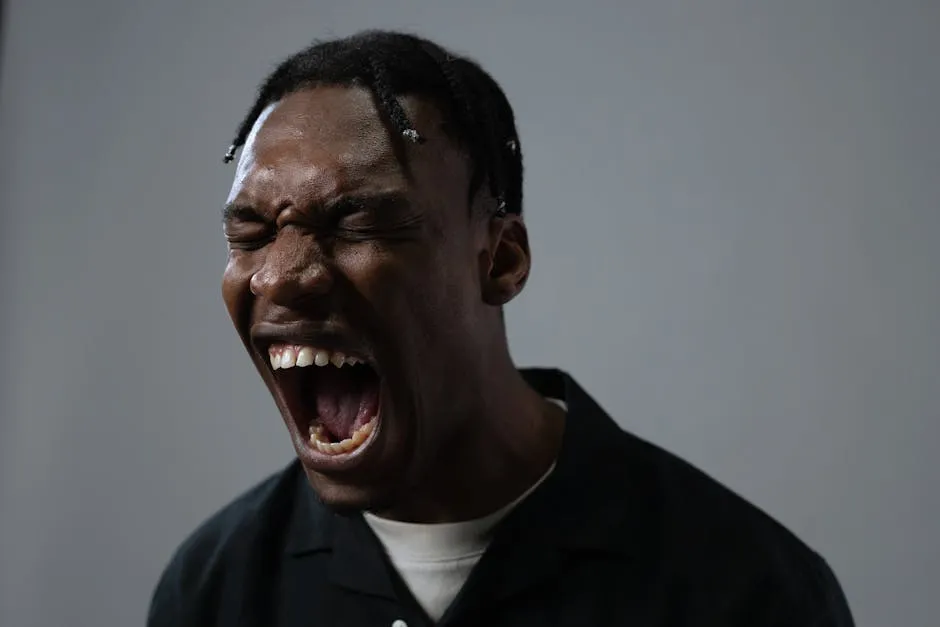
Why Did Gus Kill Victor in Breaking Bad?
Introduction
Breaking Bad is a landmark in television history. It transformed the way we view antiheroes and complex narratives. One of the show’s most chilling characters is Gus Fring. His ruthless tactics cement his reputation as a formidable drug lord. But why did Gus kill Victor, one of his most loyal henchmen? This question has sparked endless debates among fans.
If you want to dive deeper into the world of Breaking Bad, consider grabbing Breaking Bad: The Complete Series [DVD]. It’s the perfect way to relive the tension and drama from the comfort of your couch!

Summary and Overview
Victor’s death occurs in the iconic “Box Cutter” episode. This moment follows a series of tense events, including the murder of Gale Boetticher. Victor had been closely tied to Gus’s meth operation, serving as a crucial link between him and Walt. Their relationship dynamics reveal themes of power, loyalty, and the dire consequences of failure. Fans remain captivated by this pivotal moment, often discussing its implications for the series and its characters.
For those who love to cook, why not channel your inner Gus with Breaking Bad: The Official Cookbook. Master the art of cooking with a touch of criminal flair!

Gus Fring’s Role in Breaking Bad
The Character of Gus Fring
Gus Fring epitomizes the duality of a businessman and a drug lord. On the surface, he runs a successful fast-food chain, Los Pollos Hermanos. However, beneath this facade lies a mastermind controlling a vast drug empire. His character traits include extreme caution, intelligence, and an unwavering commitment to power dynamics. Gus meticulously manages his operations, ensuring everything runs smoothly. This calculated approach makes him a compelling yet terrifying figure. For a deeper understanding of Gus, watch Breaking Bad.
And if you’re looking to channel your inner Gus in the kitchen, you might want to invest in a High-Quality Chef’s Knife. Because every cook needs a sharp edge to their culinary exploits!

The Build-Up to Victor’s Death
Leading up to the “Box Cutter” episode, tensions rise significantly. Victor plays an integral role in Gus’s meth operation, overseeing Walt and Jesse’s work. However, after Gale’s murder, Victor becomes a liability. His failure to protect Gale and being seen near the crime scene heightens the stakes. This moment illustrates the precarious nature of loyalty in Gus’s world. To fully grasp the context, revisit key episodes that showcase Victor’s loyalty and the rising tension within the operation.

The Box Cutter Scene: A Chilling Turning Point
Iconic Scene Breakdown
The “Box Cutter” scene is a pivotal moment in Breaking Bad. It showcases Gus’s chilling ruthlessness and power dynamics. As the tension mounts, Gus enters the meth lab wearing a hazmat suit, signaling a shift in control. The box cutter symbolizes both his precision and brutality.
Gus’s cold demeanor as he approaches Victor is captivating. He slits Victor’s throat while maintaining eye contact with Walt. This act is not just about eliminating a liability; it’s a demonstration of power. The suspense grips viewers, leaving them in shock. Gus’s calculated move reaffirms his authority, making it clear that loyalty is fleeting.

If you want to add a bit of excitement to your game nights, check out the Breaking Bad Monopoly Board Game. It’s a fun way to strategize your way through the drug empire!
The Aftermath of Victor’s Murder
Victor’s death profoundly impacts Walt and Jesse’s relationship with Gus. The brutal execution instills fear in both characters. They realize that Gus will eliminate anyone who threatens his operation, regardless of loyalty. This fear shapes their actions moving forward.
The psychological impact is significant. Walt, already on a morally shaky path, becomes further entrenched in his dark transformation. Jesse, witnessing the murder, grapples with guilt and despair. This act shifts the balance of power, making Gus even more formidable. The aftermath of Victor’s death reverberates throughout the series, altering character dynamics and motivations.
While you’re contemplating the psychological aspects of the show, how about enhancing your home office setup with a Home Office Desk Organizer? Keep your workspace tidy and focused, just like Gus keeps his operations in check!

Power and Control Demonstration
Gus Fring’s decision to kill Victor is a chilling display of power. By executing Victor, he sends a clear message to Walt and Jesse. This act highlights the stark reality of their situation. Gus wants them to understand that loyalty can shift in an instant.
Victor had been a trusted member of Gus’s operation. However, his recent mistakes made him a liability. By eliminating Victor, Gus reinforces his authority. He shows that anyone, regardless of their loyalty, can be expendable. This moment establishes the brutal hierarchy within the drug world.
To keep your own life organized and efficient, consider investing in a Smart Speaker with Voice Assistant. It can help manage your tasks while you ponder the complexities of loyalty and power!

Overstepping Boundaries
Victor’s demise stems from his critical error of stepping beyond his role. As a loyal henchman, he began to overreach, trying to take on tasks outside his expertise. This ambition proved fatal.
Gus had entrusted Victor with overseeing the meth operation. However, Victor’s attempts to prove himself by cooking meth lead to disaster. He lacked the necessary skills, and this misstep did not go unnoticed. Gus viewed this as a significant breach of trust.
Victor’s eagerness to do more than his job ultimately sealed his fate. Gus’s decision to kill him sends a chilling warning to others. It emphasizes the importance of knowing one’s role in a high-stakes environment.

Betrayal and Loyalty
Victor’s actions illustrate the complex themes of loyalty and betrayal. He was fiercely loyal to Gus, yet his ambition led him to overreach. This attempt to take control ultimately resulted in his downfall.
Victor believed that demonstrating his skills would solidify his position. Instead, it exposed him to danger. His failure to protect Gale marked the turning point in his relationship with Gus. This betrayal of trust had severe consequences.
Gus’s brutal response to Victor’s missteps reveals the dark nature of loyalty in their world. It raises questions about the true meaning of loyalty when survival is at stake. The consequences of Victor’s actions resonate throughout the series, influencing other characters’ decisions and arcs.

The Nature of Evil in Breaking Bad
Gus Fring is a fascinating embodiment of evil’s complexities. He operates with a cold, calculated demeanor, often masking his ruthless nature behind a facade of civility. This duality makes him an intriguing character study in Breaking Bad. His decision to kill Victor highlights the moral implications of his actions.
Victor, once a loyal henchman, becomes expendable when he shows carelessness. By being seen at the scene of Gale’s murder, he poses a threat to Gus’s operation. Gus’s choice to eliminate him serves as a chilling reminder of the stakes involved in their world. It raises questions about loyalty and the cost of failure.
And while you ponder these moral dilemmas, why not enjoy a cup of coffee brewed with an Electric Coffee Maker with Grinder? It’s the perfect companion for your binge-watching sessions!

Conclusion
Gus Fring’s decision to kill Victor is layered with complexity. It showcases his ruthless nature while emphasizing themes of power and loyalty throughout Breaking Bad. This act sends a strong message: no one is irreplaceable. It profoundly affects the series, shaping the dynamics between characters like Walt and Jesse. Gus’s actions mark a pivotal moment, reminding us of the dangers lurking in the world of crime. The consequences of power plays and loyalty continue to resonate long after Victor’s death.

What does the box cutter symbolize in the series?
The box cutter is a chilling symbol in Breaking Bad. It represents Gus Fring’s cold, calculated ruthlessness. When Gus uses it to kill Victor, the act reveals much about his character and power dynamics.
First, the box cutter signifies control. Gus wields it with precision, showcasing his mastery over life and death. This moment is not just about eliminating a liability; it’s a statement about his authority. By killing Victor in such a brutal way, Gus asserts that loyalty is temporary.
Second, the box cutter reflects the harsh realities of the drug world. It serves as a reminder of the violent consequences of failure. Gus’s choice to use this particular tool adds to the shock value, emphasizing the brutality of his actions.

Is Gus Fring a sympathetic character despite his actions?
Gus Fring walks a complex line between villain and antihero. On one hand, he exhibits chilling ruthlessness. He eliminates Victor without hesitation, showcasing his willingness to sacrifice even loyal subordinates. This stark action paints him as a cold-blooded drug lord.
However, there are layers to his character. Gus operates with a sense of purpose. He seeks to maintain control over his empire while projecting an image of legitimacy. This duality can evoke some sympathy. After all, he navigates a dangerous world where trust is scarce.

To keep your creative juices flowing, you might want to jot down your thoughts in a Personalized Leather Journal. It’s a great way to explore your thoughts on morality!
What does Victor’s death signify about loyalty in Breaking Bad?
Victor’s death serves as a stark reminder of loyalty’s fragility in Breaking Bad. His execution highlights the high stakes in Gus’s world. Despite being a loyal henchman, Victor’s ambition and mistakes lead to his downfall.
Loyalty is not enough to protect one from Gus’s wrath. Victor’s carelessness, particularly being seen at Gale’s murder scene, transforms him into a liability. Gus’s brutal response illustrates that loyalty can vanish quickly in their dangerous environment.

And if you want to stay hydrated while contemplating these themes, consider a Premium Quality Water Bottle. Stay refreshed as you dive into the depths of loyalty!
How do fan theories explain Gus’s motivations?
Fans have speculated extensively about Gus’s motivations for killing Victor. Some theories suggest practicality played a significant role. Victor was seen at the murder scene, posing a risk to Gus’s operation. Eliminating him prevented potential exposure to law enforcement.
Another popular theory revolves around Victor’s overstepping boundaries. By attempting to cook meth, Victor tried to take on tasks he wasn’t qualified for. This act of ambition angered Gus, leading to his decision to kill him.
Some fans also argue that Gus’s actions stem from a deeper psychological need to assert dominance. By killing Victor in front of Walt and Jesse, Gus demonstrates that he can eliminate anyone who threatens his control. This power play instills fear in them, ensuring their compliance moving forward.
These theories reflect the complexities of Gus’s character. Each perspective adds nuance to our understanding of his motivations. If you want to explore even more about the series, consider checking out Breaking Bad: A Complete History of the Series. It’s a great way to dive deeper into the lore!

Please let us know what you think about our content by leaving a comment down below!
Thank you for reading till here 🙂
All images from Pexels




